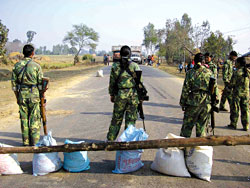 Two weeks after the Maoists pulled out of their unilateral ceasefire what do we have?
Two weeks after the Maoists pulled out of their unilateral ceasefire what do we have?
. Six policemen killed in hit-and-run raids on pickets
. No attacks on army bases or patrols
. Systematic bombing of development infrastructure, especially district education offices and municipality buildings
. All attacks so far in western Nepal while King Gyanendra tours the east
. State security more intent on foiling political rallies than hunting Maoists.
The Maoists are building up violence ahead of the big bangs they hope to unleash in the first week of February. But they appear not to be in a very target-rich environment.
The army has used the ceasefire period after the Pili attack to strengthen perimeter defences of its bases. They are vulnerable only on patrol or in the open highway. Indeed, in western Nepal it increasingly looks like the army controls the skies while the Maoists control the highways.
On 9 January the Maoists blocked an entire section of the East West Highway between Kohalpur and Chisapani and held a public meeting for an entire day right on the highway itself. The audacity of this move was unprecedented: it was done within 25 km of two major army bases and journalists were invited.
Guerrillas with assault rifles guarded roadblocks and frisked everyone going in. Maoist incharge Comrade Athak said this was part of the rebel strategy to "control the roads and move to the city".
Security sources told us later that they knew the meeting was taking place. But it was clear the army didn't want to risk driving in convoys along a jungle road vulnerable to ambush and landmine attacks. Even the Maoists guarding the roadblocks didn't look worried.
But then an army Lancer helicopter arrived and circled overhead. People attending the meeting fled in panic, the rebels took cover. The army's display of air power did force the Maoists to cancel a scheduled march past by two of its brigades and a speech by an unnamed central committee member.
Looking at the Maoist bandobast it was clear the rebels were preparing for a major attack somewhere. Sure enough, on Wednesday night these same guerrillas were involved in simultaneous attacks on Dhangadi, Tikapur and Sukkhad during which they overran at least one police post and ransacked the armoury.
With three weeks before the municipal polls, which the Maoists have said they will disrupt and the political parties say they will boycott, it is clear that the security forces are overextended. They have to keep an eye on the political parties, they have to guard polling booths and they have to defend themselves from Maoist attacks.
So, the Maoist announcement of a six-day national shutdown 5-11 February to disrupt the polls looks like a blessing in disguise for the security forces. It will curtail the movement of party activists and they can concentrate on guarding the voting booths.
PICTURE CAPTION: CUTTING IT OFF: Maoist fighters guard a roadblock on the East West Highway at Bansgadi on Monday for a public meeting. PIC: RAMESWOR BOHARA


